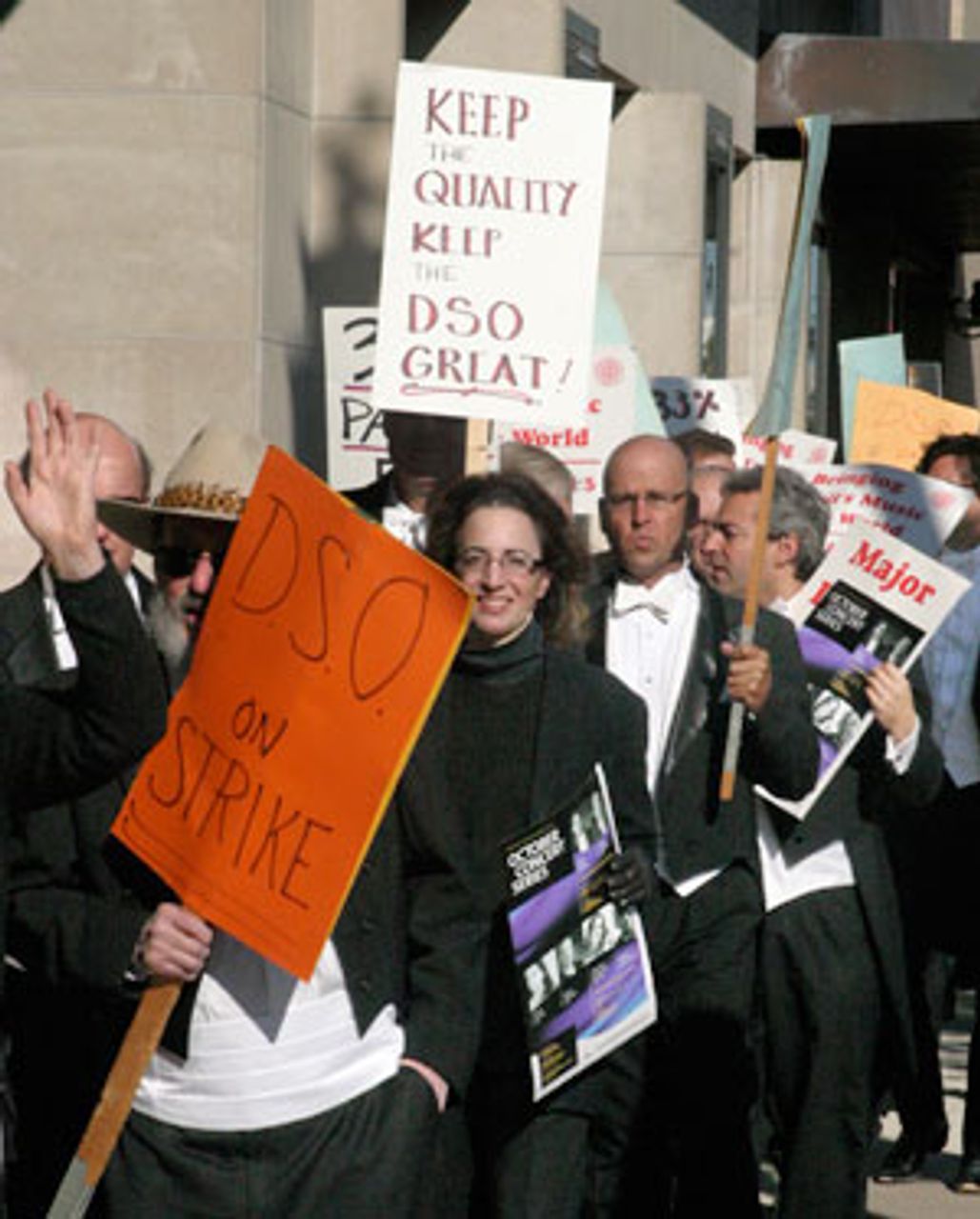Details of the tentative contact settlement between musicians of the Detroit Symphony Orchestra (DSO) and management confirm that the outcome of the six-month strike represents a bitter setback for members of the orchestra and the population of Detroit.
 DSO musicians picketing at Orchestra Hall
DSO musicians picketing at Orchestra Hall on the first day of the strike
Full details have not been made public pending the ratification vote. However, a knowledgeable source told the WSWS that even though the pay cuts contained in the agreement are not as draconian as those imposed by management last fall, the settlement drops the DSO “out of the front rank of orchestras,” pegging musicians salaries below smaller regional orchestras such as Minneapolis and Pittsburgh.
The source reported that musicians repulsed the two-tier wage system demanded by management, which called for a 42 percent pay cut for new musicians. The new agreement also contains a $198 weekly electronic media guarantee for radio broadcasts, something that was not contained in the previous contract. Management did obtain some but not all of the changes in work rules it wanted, which would have turned musicians into little more than servants at the beck and call of management.
According to a report in the Financial Times, which cited an unnamed musician, the starting salary in the first year of the contract will be $71,080, compared to $104,650 in the previous agreement. Pay would rise to $74,600 in the third year, much less than the $96,000 initially proposed by musicians. With the electronic media guarantee the minimum salary would be about $79,000. An optional community outreach component would add $3,450 per year for work outside that required by the contract.
Musicians walked out October 4 after management imposed a 33 percent pay reduction to $70,200. With the media guarantee, the total first year cut in pay contained in the tentative settlement amounts to a little less than 25 percent.
While the outcome of the vote on the proposed agreement will not be known until Thursday, musicians voted to return to rehearsals this week in preparation for a free weekend concert at Orchestra Hall sponsored by DSO management.
A musician contacted by the WSWS called the settlement “Certainly not a victory, but not a total defeat. It did not go exactly how they wanted, but it went too much how they wanted. We had put together a great orchestra and one that could compete with any orchestra in the country. Now, after a period of time, there will be a noticeable difference.”
This outcome is primarily the responsibility of a management that speaks for a pig-headed and philistine ruling e lite that is indifferent to the great cultural achievement embodied in the DSO. Management set out consciously to destroy a world class orchestra. The settlement will be used as a club to intimidate musicians and other artists around the country.
The settlement comes as the Syracuse [New York] Symphony, a significant regional orchestra, has just announced the suspension of the rest of its concert season due to a budgetary crisis. The orchestra cited cuts in public funding, declining ticket sales and a fall in private donations for its decision. Management acted after musicians rejected a $1.3 million cut in wages and benefits.
The major unions, principally the United Auto Workers, played a typically treacherous role, leaving the musicians isolated. During the course of the six-month strike the area unions, with a dues-paying membership in the Detroit Metropolitan area in the hundreds of thousands, did not call one mass rally or organize a single solidarity action with the musicians.
That management did not impose an even more severe defeat is a tribute to the determination and unity of the musicians, who aggressively rallied public support, holding a series of 19 highly successful community concerts throughout the Detroit metropolitan area. Talented guest artists and conductors from across the country donated their time to ensure the success of these events. DSO strikers received an outpouring of support from musicians in the US and internationally, who donated some $250,000 to the local’s strike fund. The funds helped defray the costs of the support concerts and provided money for emergency loans and supplemental strike pay.
Musicians resisted a campaign of almost nonstop disinformation and provocations by management. They created their own highly professional web site which kept the membership and the public informed with regular updates.
The determined stand by DSO musicians undoubtedly took management by surprise. Management officials no doubt expected that the musicians would be quickly isolated and cowed. Their determined resistance and the broad public sympathy they won is one sign of a broader spirit of opposition growing in the working class reflected in the outbreak of mass protests in Wisconsin.
At the same time the strike revealed problems of leadership and perspective in the working class. The initial offer by musicians to accept concessions expressed a certain agreement with the premise advanced by management that there was “no money.” Of course the ruling elite finds plenty of money when it comes to fighting wars, to awarding massive CEO pay packages and multi-trillion dollar bank bailouts. There is only “no money” when it comes to the needs of working people, including access to art and culture.
The fight to defend art and culture is in essence a political struggle. It requires the mobilization of the only social force interested in the defense of the artistic and cultural achievements of mankind against the modern-day barbarians on Wall Street. This requires the building of a independent political movement of the working class based on the fight for socialism.
